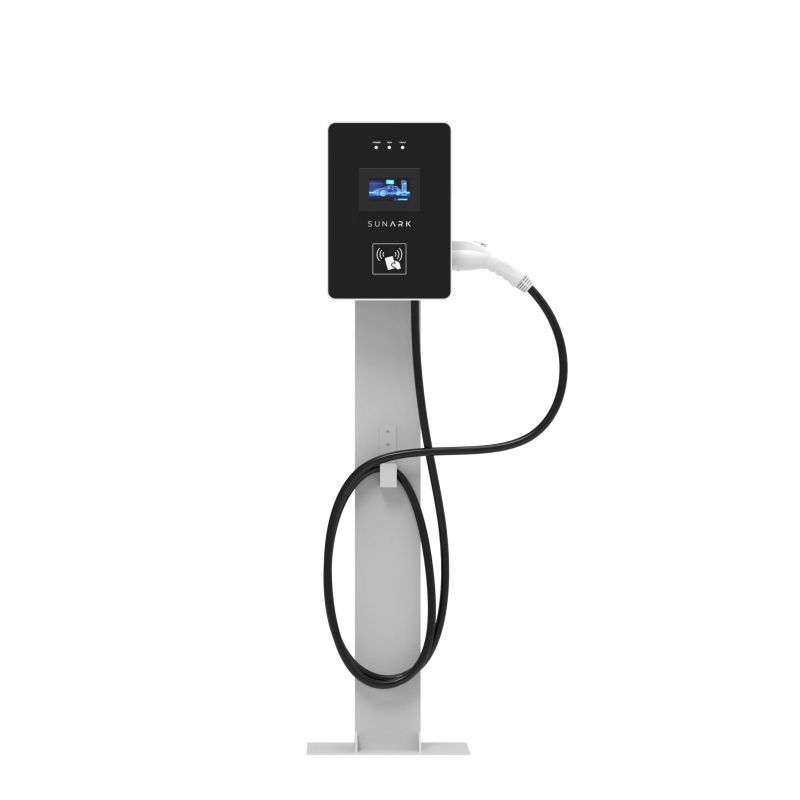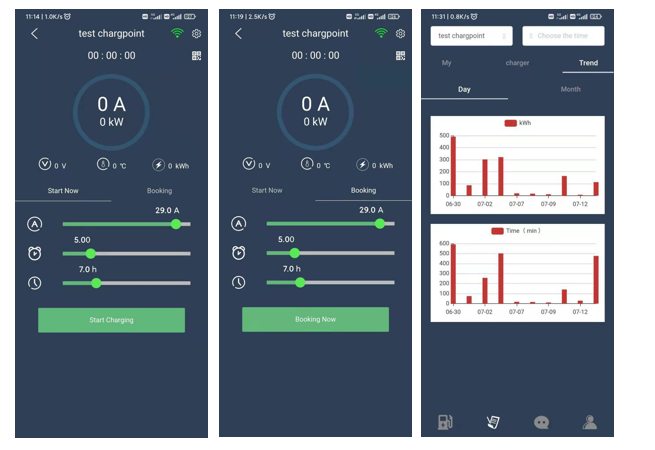The market for EV chargers is booming, driven by the increasing adoption of electric vehicles and the need for a reliable and accessible charging infrastructure. As the EV market continues to expand, the demand for EV chargers is expected to grow rapidly, presenting significant opportunities for businesses operating in this sector.
Standard:
SAE Standard / IEC StandardRated Frequency:
50/60HzConnector type:
Type 1 / Type 2Connector Mechanical Operating Life:
≥10000 timesExternal Communication:
LAN (RJ-45) and Wi-FiCooling Method:
Natural Cooling
The trend of EV charge stations, also known as electric vehicle charging stations, is on the rise as the adoption of electric vehicles (EVs) continues to grow. Here are some key trends in the EV charge station industry:
Increasing Infrastructure: As more people switch to electric vehicles, there is a growing need for a robust charging infrastructure. Governments, utility companies, and private businesses are investing in the installation of charging stations to support the increasing demand.
High-Speed Charging: One significant trend is the development of high-speed charging stations. These stations, often referred to as DC fast-charging stations, are capable of providing a substantial amount of power to EVs, allowing for quick charging and reduced downtime. Fast-charging technology like CHAdeMO, CCS (Combined Charging System), and Tesla Superchargers are becoming more widespread.
Public and Private Stations: Charging stations can be found in various locations, including public areas such as parking lots, shopping centers, and highways, as well as in private settings like homes and workplaces. The availability of charging stations in public spaces is crucial to ensure long-distance travel convenience and reduce range anxiety.
Smart Charging: With advancements in technology, EV charge stations are becoming more intelligent. Smart charging stations can communicate with the power grid, allowing for load management, optimization of charging schedules, and integration with renewable energy sources. This helps in balancing electricity demand, reducing costs, and maximizing the utilization of renewable energy.
Integrated Payment Systems: To simplify the charging process, there is a growing trend towards integrated payment systems. Users can pay for their charging sessions using various methods, including mobile apps, RFID cards, or credit cards. This simplifies the experience for EV owners and encourages more widespread adoption.
Network Expansion: Charging station operators are forming networks that provide users with access to a wide range of charging stations. This allows EV owners to easily locate and use charging stations, even when traveling across different regions or countries. Network operators often offer membership programs and roaming agreements to enhance the convenience and accessibility of charging infrastructure.
Renewable Energy Integration: Many charging station operators are incorporating renewable energy sources into their infrastructure. By using solar panels or wind turbines, charging stations can reduce their carbon footprint and support the growth of cleaner transportation.
Overall, the trend of EV charge stations is characterized by the expansion of infrastructure, the development of high-speed charging capabilities, the integration of smart technology, and the promotion of renewable energy sources. These trends aim to provide convenient and sustainable charging solutions to support the growing number of electric vehicles on the roads.

To use an EV charger, follow these general steps:
1- Choose the appropriate charger: Determine the type of charging station you need based on your vehicle's compatibility and your charging requirements. Level 1 chargers usually come with the vehicle and can be plugged directly into a standard electrical outlet, while Level 2 and DC Fast Chargers require specialized stations.
2- Locate an EV charging station: Find an EV charging station near your location. There are various online platforms, mobile apps, and navigation systems that provide information about the nearest charging stations.
Connect your vehicle to the charger:
a. For Level 1 chargers:
Plug the charger into a standard electrical outlet.
Connect the other end of the charger cable to your vehicle's charging port.
Ensure the connection is secure.
b. For Level 2 chargers:
Locate the charging station and parking spot designated for charging.
Unlock the charging cable from the station (if necessary).
Identify the charging port location on your vehicle.
Connect the charger cable to your vehicle's charging port.
Ensure the connection is secure.
c. For DC Fast Chargers:
4- Locate a compatible DC Fast Charger station.
Pull up to the charging station and park in the designated spot.
Identify the charging port location on your vehicle.
Connect the charging cable to your vehicle's charging port.
Ensure the connection is secure.
Start the charging process:
5- Some charging stations require authentication or payment by mobile app, RFID card, or credit card. Follow the instructions provided by the charging station to initiate the charging process.
If the station doesn't require authentication, the charging process may automatically start once the connection is established.
Monitor the charging progress: Most charging stations display the charging status on the station itself, or you can check it through a mobile app or the vehicle's dashboard if available.
Wait and disconnect:
6- Allow the vehicle to charge until you've reached your desired battery level or until the charging session is complete.
When you're ready to stop charging, follow the instructions to safely disconnect the charger from your vehicle.
Properly coil and store the charging cable if necessary.

Right process to connect a DC charge station:
Check compatibility: Ensure that your electric vehicle is compatible with the DC charger and the specific charging standard it supports (e.g., CHAdeMO, CCS, Tesla Supercharger).
Inspect the station: Assess the charging station for any visible damage or signs of malfunction.
Connect the cable: Lift the charging connector, which is often attached to a cable, and insert it into the vehicle's charging port.
Follow station instructions: Look for any instructions or prompts displayed on the charging station's screen, if available.
Start charging: Once the connection is established and any required authentication is completed, the charging session should automatically start.
Wait for completion: The charging process may take anywhere from a few minutes to an hour or more, depending on the battery capacity, charging speed, and required charge level. Use this time to take a break, run errands, or relax nearby.
End the session: Once the desired charge level is reached, or you no longer need to charge, follow the instructions on the charging station to stop the charging session properly.
Disconnect and secure the cable: Once the charging session is stopped, unplug the charging connector from the vehicle's charging port.

To monitor the EV charge station, we should do follow steps:
Centralized Monitor System: EV chargers can be connected to a centralized monitoring system that allows operators or administrators to remotely monitor the charging status, energy consumption, and any faults or abnormalities of the chargers.
Mobile Applications: Many EV charger manufacturers provide mobile applications that allow users to monitor and control the charging process.
Website: Some EV charging networks offer web portals where users can log in to monitor their charging sessions, view charging history, and access other relevant information.
RFID or NFC Card: EV chargers can be equipped with RFID (Radio-Frequency Identification) or NFC (Near Field Communication) card readers.
Display Screens: Many EV chargers have built-in display screens that show real-time charging information, such as charging power, charging time
The EV charger market is rapidly evolving as the adoption of electric vehicles increases. There is a growing infrastructure of public and private charging stations to support EVs, and more companies are entering the market to provide charging services and develop innovative solutions to meet the charging demands of electric vehicles.
FAQs:
Q1: Do you support OEM/ODM?
A:Definitely, OEM&ODM service is supported with a certain quantity,including customize logo,package and label;
Q2: What's the production time?
A: The production time is normally 15 working days. but we will always prepare some stocks for popular models.
Q3: Can you provide DDP service?
A:Yes, if you are a personal customer and don't want to deal with the customs, we can provide DDP service to your address.
Q4: What about the warranty and how to claim?
A: Warranty period are 5 years since you receive the product, our professional after-sales team will deal with all warranty issues.